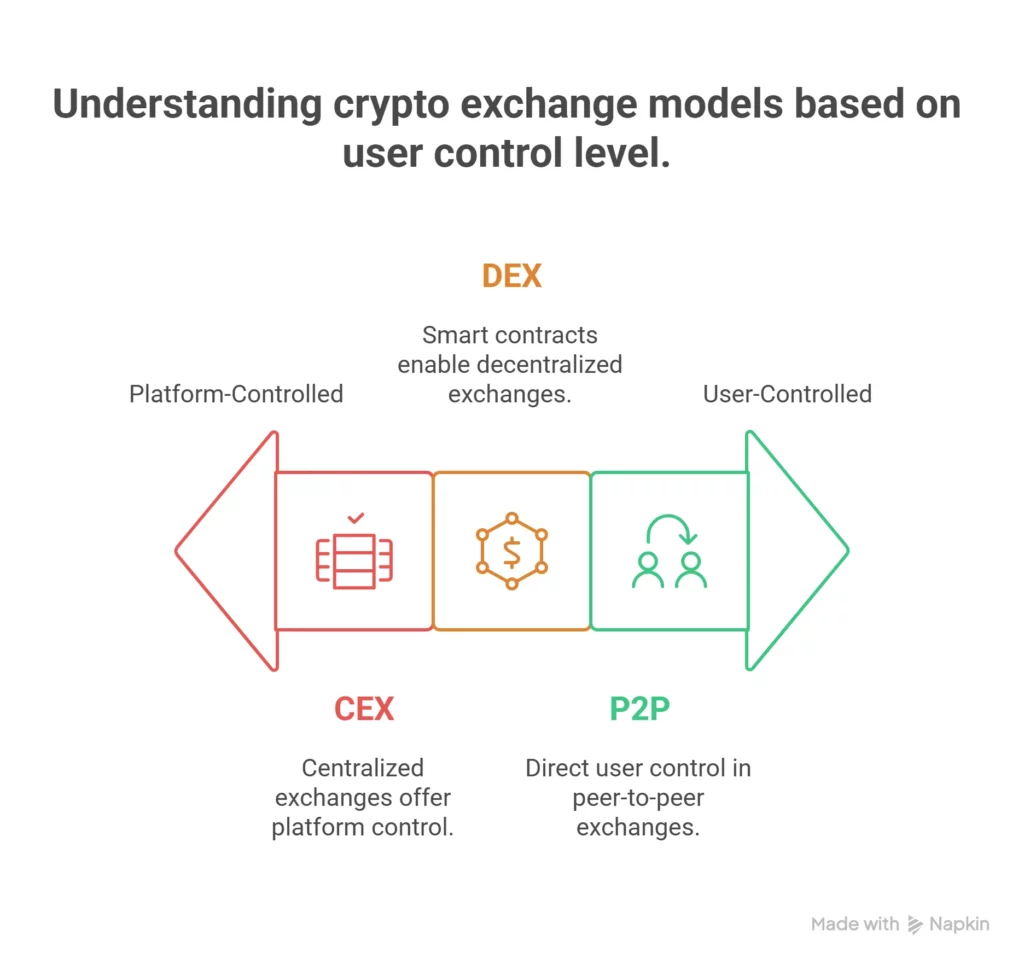If you’ve ever watched Bitcoin’s price swing like a pendulum and thought, “Dang, I should be building something around this,” you’re not alone. P2P crypto exchanges are one of the most accessible ways to break into the crypto world—not as a trader, but as a builder. It’s where the real magic (and margin) happens.
A couple of years ago, a friend tried launching a P2P crypto platform using freelancers and plugins from here and there. Let’s just say things went south quicker than a coin in a bear market. Lesson? You can’t bootstrap your way through security, liquidity, and user trust. If you want to win this game, you’ve got to play smart from day one.
That’s where the opportunity lies: to create a secure, scalable, and intuitive platform that actually serves users better than the likes of Paxful or LocalBitcoins. If you’re curious how to build such a platform, and maybe even clone the big names—Miracuves has your back. Let’s break this down.
What is a P2P Crypto Exchange?
A Peer-to-Peer (P2P) crypto exchange is a decentralized platform where buyers and sellers trade directly with each other—no third-party middlemen involved. Unlike centralized exchanges (like Binance or Coinbase), users set their own prices and terms. The platform acts as a neutral ground, ensuring secure trades via escrow, reputation systems, and dispute resolution.

Why people love P2P exchanges:
- Freedom to set own prices
- More payment method options
- Lower fees in many cases
- Ideal in countries with crypto restrictions
Why P2P Exchange Businesses Are Booming
Crypto adoption has moved from tech bros to everyday folks. With that, people want autonomy, privacy, and flexibility in how they buy and sell crypto. And P2P exchanges deliver just that.
According to Statista, global crypto users crossed 420 million in 2023, and platforms enabling direct trades—especially in underbanked regions—are witnessing explosive growth.
Source: Statista – Crypto User Statistics
Steps to Start a P2P Crypto Exchange Platform
1. Pick Your Business Model
- Commission-based: You take a small fee per transaction (popular choice)
- Subscription-based: Users pay for premium listings, instant trades
- Ad-based: Free to use, but monetized via banners or sponsored ads
2. Define Features & UX
Your platform’s success depends heavily on user experience. Here’s what you must include:
Security Features:
- 2FA, KYC/AML integrations
- Escrow wallet for safe transactions
- Dispute management
Trading Mechanics:
- Real-time chat between buyers/sellers
- Reputation scores
- Customizable offer postings
Payment Gateways:
- 100+ local payment methods
- Crypto + fiat wallets
3. Choose the Right Tech Stack (Or Just Clone Smartly)
You can either build from scratch (costly, complex) or go the smart route with a ready-made P2P exchange clone. This is where Miracuves’ Paxful Clone, LocalBitcoins Clone, or even MEXC Clone come into play.
Let’s break down a few:
| Platform | Strength | Why Clone It? |
| Paxful | Payment diversity | Over 300+ methods supported |
| LocalBitcoins | Simplicity & reach | Good for emerging markets |
| MEXC | Liquidity & advanced tools | Ideal if you want to hybridize P2P & spot |
| Binance P2P | Trust and volume | For big-brand level ambition |
| Remitano | UI & affiliate power | Good if you want viral growth |
| HodlHodl | No KYC model | Niche but in demand for privacy lovers |
Build vs Clone: The Smart Entrepreneur’s Dilemma
Let’s keep it real—building from scratch sounds cool, but it’s a money pit unless you’ve got VC cash and a squad of devs.
Why clones win:
- Faster launch (in weeks, not months)
- Pre-tested architecture
- Built-in monetization models
- Easier customization
At Miracuves, we’ve helped dozens of founders get their crypto platforms off the ground using these powerful clones. Think of it like starting a restaurant—not by growing wheat, but by opening a franchise of a proven brand.
How Do P2P Exchanges Make Money?
Let’s talk business, baby.
- Transaction Fees: Charge users for every successful trade
- Premium Listings: Highlight certain offers
- Ad Revenue: Monetize high-traffic pages
- Withdrawal Fees: Small % for moving crypto off-platform
- Token Economy: Launch your native coin/token (next-level game)
Who’s the Target Audience?
- Crypto-savvy individuals wanting better rates
- Users in countries with limited crypto banking
- Freelancers accepting crypto payments
- First-time buyers avoiding CEX friction
This isn’t just for “crypto bros.” Your user base will be diverse—think influencers, Gen Z side hustlers, and even retirees.
Ready to Launch? Here’s the Shortcut
You don’t need to reinvent Bitcoin to build a crypto empire. With the right P2P exchange clone—customized to your niche—you can launch a secure, scalable, and revenue-ready platform in record time.
We help innovators like you launch high-performance app clones that are fast, scalable, and ready to monetize. Got a vision in mind? Let’s build it—together.
FAQs
Q1. What is the difference between a P2P and centralized crypto exchange?
P2P exchanges connect buyers and sellers directly, while centralized ones hold user funds and act as a middleman.
Q2. How much does it cost to launch a P2P exchange?
It depends on features and tech stack. With a Miracuves clone, it’s way more affordable than building from scratch.
Q3. Is it legal to run a P2P crypto exchange?
That depends on your country. Some require licenses; others allow P2P trades with light KYC. Always check local laws.
Q4. Can I start small and scale later?
Absolutely. You can launch with basic features and expand to spot trading, wallet integrations, or even NFTs.
Q5. What security measures are a must-have?
Escrow system, 2FA, SSL encryption, and strong KYC tools are essential. Don’t compromise on this.
Q6. Which clone is best for beginners?
Paxful Clone is user-friendly, while LocalBitcoins Clone is ideal for targeting emerging markets.








